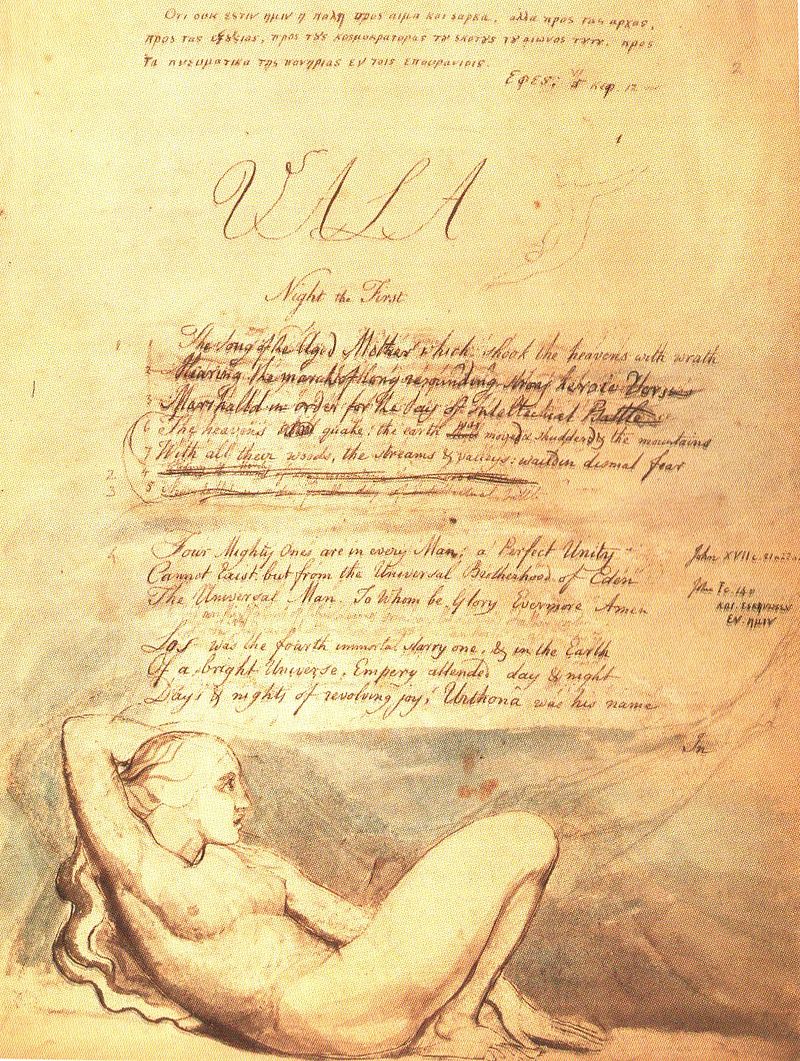Jerusalem, Plate 29 [33], (E 175)
"Vala replied in clouds of tears Albions garment embracing
I was a City & a Temple built by Albions Children.
I was a Garden planted with beauty I allured on hill & valley
The River of Life to flow against my walls & among my trees
Vala was Albions Bride & Wife in great Eternity
The loveliest of the daughters of Eternity"
Blake often portrayed the original fall of man in terms of a plot between Urizen, man's reasoning mind and Luvah, man's emotional heart. But as the battleground shifted Luvah's emanation Vala, became prominent in the development of the myth. Blake's first epic was originally named Vala, not the Four Zoas. Blake saw that man was enthralled by his attachment to the natural world represented by Vala. The object to which the emotions respond had replaced the activity of engaging in spontaneous emotional involvement. Man began to serve Vala, as Nature, instead of being served by nature. The label 'good' was attached to the feminine world of externals, resulting in the neglect of the masculine internal world.
The Eternal world of Luvah and Vala had been Beulah, the state of sweet repose where there is no dissension and contraries are equally true. Outside of Beulah, Vala assumed several identities: she was the temptress who lured Albion away from Jerusalem; she was the veil which concealed from man the recognition of Eternity; she was the means by which the moral law was imposed on man; she was the instrument of vengeance when her religion of Mystery gained power.
| Yale Center for British Art Jerusalem Plate 32 Vala & Enitharmon |
Four Zoas, Night I, Page 1, (E 305)
"Hear! I will sing a Song of Death! it is a Song of Vala!
The Fallen Man takes his repose: Urizen sleeps in the porch
Luvah and Vala woke & flew up from the Human Heart
Into the Brain; from thence upon the pillow Vala slumber'd.
And Luvah seiz'd the Horses of Light, & rose into the Chariot of Day
Sweet laughter siezd me in my sleep! silent & close I laughd
For in the visions of Vala I walkd with the mighty Fallen One
I heard his voice among the branches, & among sweet flowers."
Jerusalem, Plate 29 [33], (E 176)
"thou & I, hid the Divine Vision
In cloud of secret gloom which behold involve me round about
Know me now Albion: look upon me I alone am Beauty
The Imaginative Human Form is but a breathing of Vala
I breathe him forth into the Heaven from my secret Cave
Born of the Woman to obey the Woman O Albion the mighty
For the Divine appearance is Brotherhood, but I am Love"
| Yale Center for British Art Jerusalem Plate 51 Vala, Hyle, Skofield |


No comments:
Post a Comment